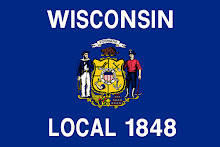MADISON – As the state budget impasse between the Republican
Senate and Republican Assembly continues, Rep. Gordon Hintz (D-Oshkosh) offered
five budget tips for legislative Republicans to help pass a responsible budget.
1. Pass a
long-term transportation funding solution to address the ongoing
shortfall. As long as transportation
funding relies on increased borrowing or delayed projects, budgets will remain
difficult. If you continue borrowing, more transportation revenue is spent
paying off debt and interest. Plus important building projects in the UW System
will be cut in order to manage total state debt. If you raid the general fund to pay for
roads, that funding comes at the expense of other state investments like K-12
public education. If you continue to delay projects, those cost increase, the
state spends more on maintenance, and the problem will get worse for the
2019-21 budget. You increased fees to fund our state parks so it is hard to
understand what is different here. Just fix it.
2. Fund your most
important priorities first. If funding K-12 education is truly the most
important investment, then start there and pay for Wisconsin’s public schools
first. This might mean you don’t have
enough money to repeal the state forestry mill tax for $180 million or fund the
Governor’s increased school levy credit at the full amount. But if putting
dollars in classrooms around the state is really a priority, then there should
not be a disagreement.
3. Don’t create
new spending programs when you are unable or unwilling to fund existing ones.
If you are struggling to fund K-12 education or the UW System’s existing
programs, don’t create new ongoing expenses like expanded taxpayer supported
private school vouchers for kids that are already going to private school. And reconsider the new $3 million already
approved for a new redundant public policy school of conservative thought.
4. Don’t phase in
tax cuts you won’t be able to pay for in the future. The manufacturing and
agriculture tax credit was passed in the 2011 budget at the last minute, with
zero public hearing or input. It was supposed to be gradually phased in
starting in 2013 before reaching a total annual cost of $128 million in 2017
when fully implemented. The cost of the credit in the current 2015-17 budget is
$517.4 million. Despite modest growth in state revenue, programs were cut in
order to pay for the credit, such as the $250 million cut to the UW
System. It is now expected to cost
$320.2 million in FY2018 and $334 million in FY2019. Don’t make this mistake
again. Before you consider proposals
such as repealing the personal property tax, make sure you can pay for it in
the future. Since the Governor’s proposed budget spends $366 million more than
the revenue collected, it is unlikely that the state will be able to cover the
local revenue loss in future budgets without cutting other state programs.
5. Don’t use
one-time money to pay for ongoing expenses. Spending one-time money from an
existing fund balance or transferring money from a segregated account to cover
ongoing general fund expenses creates future imbalances. It is irresponsible to use one-time money
during a period of modest economic growth. Raiding the state veterans nursing
home fund to pay for ongoing veterans trust fund programs creates future
imbalances. When balances run out, the state general fund will have to cover
the cost.














No comments:
Post a Comment